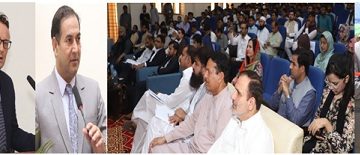RAHIM YAR KHAN, May 13: An international conference was organized at KhwajaFareed University of Engineering and Information Technology (KFUEIT) in which local and international experts participated as keynote speakers. The conference was titled ‘Water, Energy, Food and Ecosystem (WEFE) Nexus for Indus Basin’. The conference was jointly organized by the International Water Management Institute (IWMI) Pakistan, the International Food Policy Research Institute (IFPRI), and the Department of Agricultural Engineering of KFUEIT.
The various stakeholders who attended the workshop included officials from the private sector, FFC, progressive farmers, Punjab Irrigation Department, and Government of Punjab’s On Farm Water Management (OFWM) department, and Pakistan Council of Research in Water Resources (PCRWR). Approximately 150 people participated in the workshop.
The conference was attended by Dr. MohsinHafeez, Country Representative – Pakistan and Regional Representative – Central Asia, IWMI and Dr. Stefan Uhlenbrook, Strategic Program Director (IWMI) – Water, Food and Ecosystemsas guest speakers. Experts from local, national and international NGOs and the private sector also participated in the workshop. In his welcome address, Vice Chancellor Prof. Dr. Muhammad Suleman Tahir said that it is the responsibility of universities to offer solutions to the problems regarding local agriculture and industry. He said that the purpose of the international conference is to come up with solutions to the problems of basic necessities such as water and food. According to Muhammad Suleman Tahir, “With the presence of international experts, we can benefit from the experiences of developed countries such asGermany, Netherlands and Australia.”. He added that universities, agronomists and farmers could work together to solve these problems. In this regard, Khawaja Fareed University of Engineering and Information Technology will continue to play its full role. Now the water scarcity in Cholistan was alarming. Today we launched the “Save Water for Cholistan”campaign from this university platform.
According to Dr. MohsinHafeez, “There is an ongoing heatwave in Southern Punjab and Sindh, which is having implications on the availability of canal water and impacting agriculture. There is a need to assess temperature rise in northern Pakistan and its repercussions on glaciers, which significantly contribute to the Indus River.”
“Localized interventions such as village ponds can help to meet water demand at the village level and can also contribute towards groundwater recharge.”
Addressing the workshop participants, Dr. Stefan Uhlenbrookshared the Water-Energy-Food-Ecosystem (WEFE) Nexus approach and its significance in empowering rural livelihoods, food and nutrition security, and sustainable growth.
He also shared the salient features of the recently launched NEXUS Gains initiative: Realizing multiple benefits across water, energy, food, and ecosystems (forests, biodiversity), which is being implemented across Pakistan, Ethiopia, India, and Nepal. – PR
- Latest
- Trending





